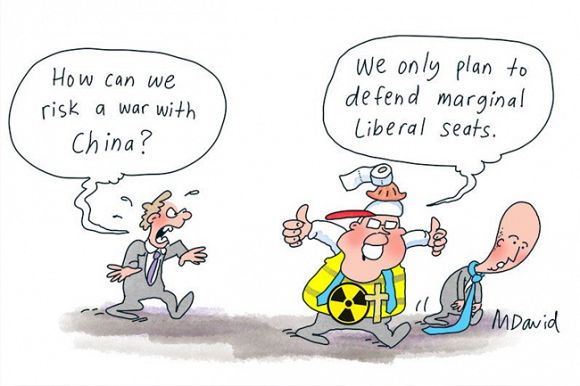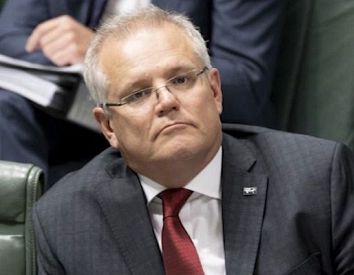Prime Minister Scott Morrison's security pact with the U.S. and UK is damaging Australia's reputation on the world stage, writes Paul Begley.
THE AUSTRALIAN mainstream media by and large greeted with cheers the recent announcement by the Prime Minister of an AUKUS nuclear submarine deal with the United States and Britain.
From both sides of the Atlantic, however, the reaction to Prime Minister Scott Morrison’s secretive and audacious breach of contract with the French submarine builder, Naval Group, has been more critical, a view echoed within Australia by former Prime Ministers Paul Keating and Malcolm Turnbull, among others.
Morrison’s defence to critics on announcing the AUKUS agreement has been to say it was done in pursuit of Australia’s national interest. His insistence that the decision was prompted by Australia’s need for a nuclear-powered submarine has been hotly contested by Turnbull.
The former PM argued if that were the case, the low enriched uranium (LEU) used for propulsion by the French would be more suited to Australia’s sovereign needs than a U.S. or UK submarine, which would make Australia dependent on weapons-grade high enriched uranium (HEU). This, in turn, will almost certainly require Australia to build and maintain the submarines in the U.S. or Britain rather than Adelaide.
The Times in London carried a report on Turnbull’s speech to Australia’s National Press Club on Wednesday, noting Morrison’s predilection for secrecy, even to the point of keeping his own navy in the dark:
‘Last week a French Ministry of Defence spokesman said that Naval Group had received an official letter from the Australian Navy saying it was “extremely satisfied that performance of the French submarine was excellent” on the same day the cancellation was announced.’
Like Turnbull, Keating commented on the manner of the betrayal as:
‘...rudely affronting Europe’s sole international power, France — the one European state which possesses a sophisticated military, nuclear submarines and nuclear weapons. And along with that, real Pacific national assets. A genuine Pacific power.’
Turnbull eloquently dismantled Morrison's amateurish betrayal of France and what that means for the standing of Australia on the world stage as a strategic ally or a trading partner in Europe and in our own region. He made the additional point that the Prime Minister can lie to us domestically and get away with it to a large extent, but to do so on the world stage creates a memory that can't easily be erased. It has to do with our trustworthiness and the value of our word as a nation. In global terms, the Prime Minister is the nation, he said.
While Turnbull spoke about lightly throwing away our sovereignty if the AUKUS agreement is ever finalised, he didn’t discuss its corollary. The New York Times noted that the agreement amounts to Morrison ‘betting the house’ on a gamble that involves ‘throwing our lot in with the United States for generations to come’.
That assumes the deal goes ahead, and Turnbull was clear about the likelihood of it coming to fruition:
‘Australia now has no new submarine programme at all. We have cancelled the one we had with France and have a statement of intent with the UK and the U.S. to examine the prospect of acquiring nuclear-powered submarines. But nothing is agreed.. There is no design, no costing, no contract.’
Despite an agreement being at least 18 months away, if it gets through Congress, Morrison has been talking up the idea at home as if it were a done deal. Some idea of the degree to which U.S. President Joe Biden is committed to it can be gauged by Morrison admitting he didn’t tell French Prime Minister Emmanuel Macron earlier in case he caused a fuss and turned Biden off the idea.
The depth of personal chemistry between Biden and Morrison was apparent when Biden cancelled the one-on-one meeting with him at the G7 in June and on announcing the AUKUS proposal, Biden thanked Boris and “the feller down under”. Whether Biden couldn’t recall Morrison’s name or pointedly scripted the four-word slight, the result is the same. Morrison is not held in high regard and will be less so as a result of Macron giving Biden the benefit of a character assessment of the Australian feller. It’s safe to say Biden’s main interest in the idea is likely to be that it’s a way to sell a few expensive submarines.
Much of that will not be lost on Morrison, who is exceptionally attentive about how his image is portrayed. Looking for what he sees as the benefits to be gained from the timing of the submarine announcement, there is no need to go further than observing that it comes seven months before an election is due and Morrison is in control of the starting pistol on when it will be called.
Coming on top of three years of domestic incompetence, corruption and failure, a timely war with an iniquitous neighbour would be helpful.
I refer to:
- the bushfires in 2019;
- continuing failure to accept responsibility for purpose-built quarantine;
- a humiliating and expensive judgement on the Robodebt scheme in the Federal Court to the tune of $1.8 billion;
- an unresolved rape scandal down the ministerial corridor from the PM’s office;
- a disastrous delay to the vaccination program through negligence which is keeping millions of voters in lockdown; and
- a $25 billion failure to include clawback provisions on related labour subsidy delivery.
These downsides are without mentioning energy policy inertia and inaction on climate change with a Glasgow Climate Summit threatening to send the embarrassing signal that Australia is an international pariah on climate.
Enter China, our largest trading partner, but also a nation that high-level individuals in our government have for many months been referring to in bellicose terms. Of particular note is the Defence Minister Peter Dutton and Home Affairs Secretary Mike Pezzullo, the latter’s “drums of war” address to staff in April gaining considerable national attention. Citing Taiwan, the South China Sea and Hong Kong, the Government has incrementally instilled the notion that we are at war with China.
A relatively insignificant nation such as Australia could not sensibly go to war with a mighty power such as China. It would be suicide unless we did two things: limit the actual situation to an “appearance of war” for domestic purposes and couple it with the idea of enlisting a powerful protector, namely the United States in the scope of a grand narrative. The independent researcher, Ronni Salt, suggested that idea in a recent article in The Shot where she proposes the idea of Morrison as our great protector and saviour.
That said, Morrison’s election tactic requires China not to take the idea too seriously, which is risky as was discovered in a recent interview by Stan Grant with Victor Gao. Mr Gao is a Yale-educated and well-connected Chinese international relations expert from the Centre for China and Globalisation. He made it clear that Australia will “lose the privilege of not being targeted by nuclear warheads” if we were to go ahead with the AUKUS arrangement. His analysis is a thinly disguised threat of a real China-Australia war trajectory.
Against the background to these developments is the Australian Labor Party, whose leaders appear to have accepted the AUKUS idea with astonishing docility when invited to a top security briefing the day before the big announcement. I have written on these pages before about the questionable idea of Labor over-correcting after the 2019 defeat with a small-target strategy that ends up looking like inertia.
While I won’t revisit those arguments here, suffice to say Morrison will not be an unknown Prime Minister in 2022. The election will not be a case of 2019 revisited. Morrison is a consummate communicator who projects energy, drive and resilience despite his countless failures and the incompetence and corruption that has marked his administration.
In her recent Morrison biography, The Accidental Prime Minister, Annika Smethurst makes two final observations. The first is that Morrison’s opponents underestimate him at their peril. He has made a career out of being underestimated.
The second is that he is more comfortable working with men than with women. Labor leader Anthony Albanese risks being the embodiment of both Smethurst cautions. Morrison appears comfortable with Albanese as Opposition leader and would be unlikely to enjoy as his opposite a dynamic woman with strong recognition and leadership credentials such as Senator Kristina Keneally.
Paul Begley has worked for many years in public affairs roles, until recently as General Manager of Government and Media Relations with the Australian HR Institute. You can follow Paul on Twitter @yelgeb.
Related Articles
- Under Morrison, Australia strives to be unincorporated territory of U.S.
- Wren's Week: Scott Morrison is destroying Australia's future inside and out
- BOOK REVIEW: The Accidental Prime Minister by Annika Smethurst
- CARTOONS: Mark David does diplomacy
- Scott Morrison, what the bloody hell are you doing?
 This work is licensed under a Creative Commons Attribution-NonCommercial-NoDerivs 3.0 Australia License
This work is licensed under a Creative Commons Attribution-NonCommercial-NoDerivs 3.0 Australia License
Support independent journalism Subscribe to IA.















